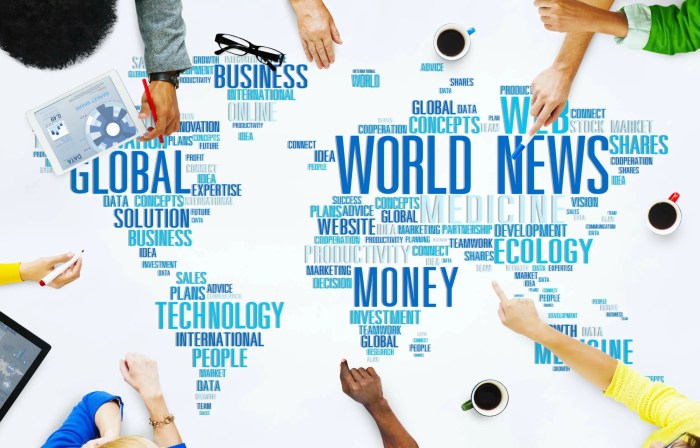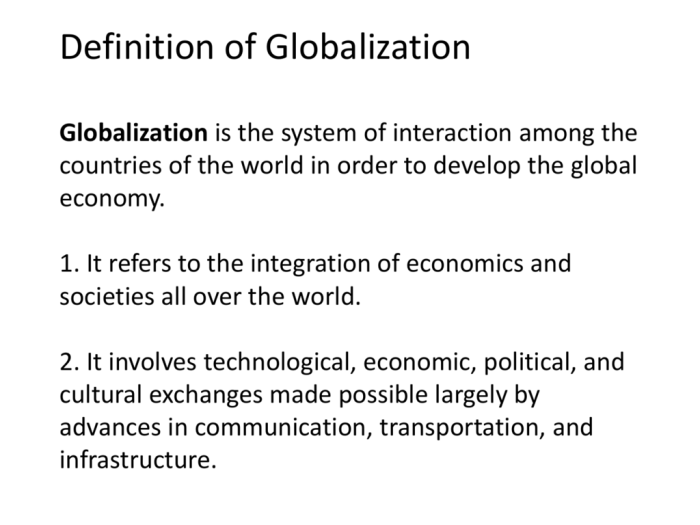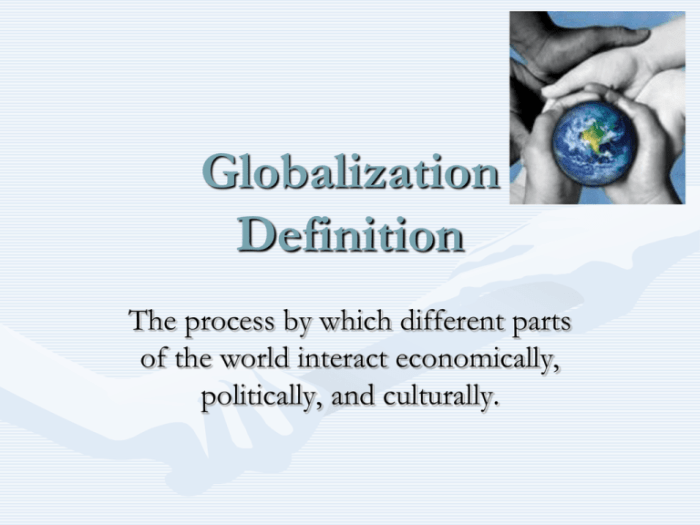Globalization definition ap world history, a term that has become ubiquitous in today’s interconnected world, encapsulates the complex and multifaceted process of increasing global interconnectedness and interdependence. From its historical origins to its profound economic, social, cultural, political, and technological implications, globalization has shaped the course of human history and continues to be a subject of intense debate and analysis.
The economic benefits of globalization, such as increased trade, investment, and economic growth, have been widely recognized. However, it has also raised concerns about economic inequality, labor market disruptions, and environmental degradation. The social and cultural impacts of globalization have been equally profound, leading to the spread of ideas, values, and lifestyles across borders, while also raising questions about cultural homogenization and the preservation of local traditions.
Globalization’s Definition

Globalization refers to the interconnectedness and interdependence of the world’s economies, cultures, and populations.
It involves the increasing flow of goods, services, capital, people, and ideas across national borders.
Historical Origins and Evolution of Globalization
Globalization has its roots in ancient trade and cultural exchanges.
The Industrial Revolution and technological advancements in the 19th and 20th centuries accelerated the process.
Economic Aspects of Globalization

Benefits of Globalization
- Increased economic growth and productivity
- Access to wider markets and cheaper goods
- Job creation and investment opportunities
Challenges of Globalization
- Job displacement and wage inequality
- Environmental degradation
- Increased competition and economic volatility
Role of International Trade, Investment, and Financial Flows
Globalization is driven by increased international trade, foreign direct investment, and financial flows.
These flows facilitate the movement of goods, capital, and services across borders.
Social and Cultural Impacts of Globalization: Globalization Definition Ap World History
Spread of Ideas, Values, and Lifestyles
Globalization has led to the spread of ideas, values, and lifestyles across borders.
This includes the spread of Western culture, consumerism, and technology.
Cultural Homogenization and Diversity
Globalization has both homogenized and diversified cultures.
While it has led to the spread of some cultures, it has also increased awareness and appreciation of diverse cultures.
Political and Security Implications of Globalization

Role of International Organizations and Global Governance
Globalization has led to the creation of international organizations such as the United Nations and the World Trade Organization.
These organizations facilitate cooperation and address global issues.
Security Challenges and Cooperation
Globalization has also posed security challenges, such as terrorism and transnational crime.
It has led to increased cooperation among nations to address these challenges.
Technological Advancements and Globalization
Communication and Transportation Technologies, Globalization definition ap world history
Advances in communication and transportation technologies have facilitated globalization.
These technologies have reduced barriers to trade and travel.
Information Technologies
Information technologies have also played a crucial role in globalization.
The internet has made it easier for people to connect, share information, and engage in global commerce.
Regional and Global Disparities
Uneven Distribution of Benefits and Costs
Globalization has led to uneven distribution of benefits and costs.
Developed countries have generally benefited more than developing countries.
Challenges for Less Developed Countries
Less developed countries face challenges in integrating into the global economy.
They often lack the infrastructure, education, and resources to compete effectively.
Controversies and Critiques of Globalization
Arguments Against Globalization
- Increased economic inequality
- Exploitation of workers in developing countries
- Environmental degradation
- Cultural imperialism
Arguments for Globalization
- Increased economic growth and prosperity
- Improved living standards
- Spread of ideas and cultural diversity
- Greater global cooperation and interdependence
Question Bank
What is the definition of globalization?
Globalization refers to the increasing interconnectedness and interdependence of the world’s countries, economies, and cultures.
What are the historical origins of globalization?
The origins of globalization can be traced back to the era of European colonialism and the development of global trade networks.
What are the main economic benefits of globalization?
Economic benefits of globalization include increased trade, investment, and economic growth.
What are the main social and cultural impacts of globalization?
Social and cultural impacts of globalization include the spread of ideas, values, and lifestyles across borders.
What are the main political and security implications of globalization?
Political and security implications of globalization include the role of international organizations and global governance in addressing global issues.